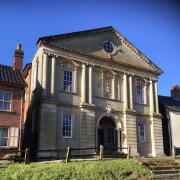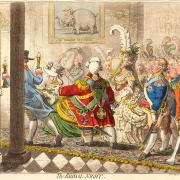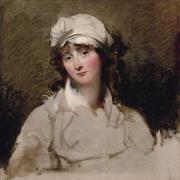Log fire burning, presents gaily wrapped under the bedecked tree, telly on (more repeats), the King’s Christmas message, turkey roasting in the oven, the family gathered, excited children, sparkly decorations, snow falling on a winter wonderland outside a leaded window... We all have our idea of what makes 'a perfect Christmas’. But what of Christmases past? With some seasonal Suffolk-connected scribes as guides, let’s journey through the past 250 years.
We all need something easily digestible during the excesses of Christmas. A Simple Story by Elizabeth Inchbald (1752-1821), from Bury St Edmunds, is regarded as one of the earliest romantic novels, a story of passion that found its way into Christmas Summary Classics, a 2013 series of abbreviated works – digest form, if you like. Inchbald’s tale isn't about Christmas per se, but it makes a suitable festive offering, as romance and passion may be on some people's minds. Christmas is a popular time for popping the question.

Christmas is a Christian festival, of course, so Lowestoft-born theologian and author Frederick Denison ('FD') Maurice (1805-72) earns his place on any Christmas list as an acknowledged ‘man of God’. In his day, Christ was at the heart of Christmas – less so today. Love Came Down: Anglican Readings for Advent and Christmas (compiled by Christopher L. Webber, 2002) has readings for Advent, leading up to Christmas Day, and the 12 Days of Christmas, that period of reflection, New Year resolutions, and partying, that ends with Epiphany on January 6, when it’s over for another year. One of the readings belongs to Maurice, who was ecumenical, believing that irrespective of our particular religion we should all rub along with good will to all.
Poet Edward Fitzgerald (1809-83) was born in Bredfield, just north of Woodbridge, and if stories and sermons can illuminate Christmas then so might a poem. But it’s Fitzgerald’s letters that interest me. Published in two volumes, his copious correspondence is a throwback to when we habitually put pen to paper. The closest we get today is often the end-of-year Round Robin inserted into Christmas cards, regaling the year’s family triumphs and disasters.
Christmas wouldn’t be the same without them but they became so annoying to journalist Simon Hoggart that he published the worst in a couple of books, subsequently published in an anthology, The Christmas Collection – the Ultimate Collection of Round Robin Letters. It might make a good gift. Fitzgerald, too, dwelt on the festive season in his letters: ‘Now I probably sha’n’t write to you again before Christmas: so let me wish you and Mrs Allen and your family a happy time of it’. He probably had too many presents that needed buying and wrapping.

Along with Victoria and Albert, Charles Dickens (1812-70) helped create the Victorian Christmas we enjoy today, or perhaps the one we imagine we should. Suffolk was well known to him. He lived in the county, reported on it as a journalist and used it as a setting for his novels. I suppose the story that resonates most at this time of year is A Christmas Carol, published in 1843, which is full of moral stuff.
Coincidentally, the person who may have inspired the infamous character Scrooge, a byword for meanness, may have been John Elwes (1714-89), a notorious miser with strong links to Suffolk. He even looked like Dickens' anti-hero. An uncle of Elwes bequeathed his fortune to his nephew when he died and Elwes ended up owning substantial Suffolk estates. He attended the races at Newmarket, travelling with nothing more sustaining than a two-month old piece of pancake in his pocket, just to save a few bob.

Christmas is a time for generosity of spirit, something which even Scrooge eventually understood, but many families still have a ‘Bah, humbug!’ merchant among them, as well as the unwanted relative who outstays their welcome. Ah, those festive season traditions.
Dickens may not have invented Christmas but he helped with its 19th century renewal and popularisation, including some elements that have endured. He was a great storyteller – who doesn't love to hear his ghost story The Signalman? But for a good Suffolk ghost story turn to MR James (1862-1936), who believed a spectral saga was the way to spend Christmas Eve, especially if the tale was written for the occasion then read convivially to friends.

Christmas Eve was the traditional time for swapping such stories, stemming from an early Christian belief that spirits and demons wandered the night before a major holy day – just like Jacob Marley. James grew up in Suffolk, in Great Livermere near Bury St Edmunds. He often returned to the county and Suffolk locations inspired his stories. Felixstowe become ‘Burnstow’ in his most famous and terrifying story, Oh Whistle and I’ll Come to You My Lad. Read it on Christmas Eve and you could find yourself wide-eyed and sleepless when Santa arrives.
Christmas is not a fixed feast, it changes with the times. But maybe there’s still a place for some fun from times past – the storytelling, shivers down the spine on Christmas Eve as we swap scary stories, a bit of good will to all, and maybe even a nod to the true meaning. Hopefully you won’t receive too many Round Robins though, or guests who overstay their welcome. Happy Christmas all!



























